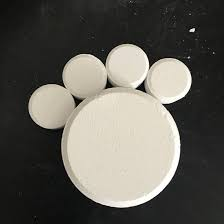Chlorine tablets are a common disinfectant used in dry cleaning, bleaching, and swimming pool water disinfection. Many people have seen and used chlorine tablets, but most people do not know how to store chlorine tablets, which leads to great loss of chlorine tablets during use. Proper storage can make chlorine tablets effective for 3-5 years.
Chlorine tablets have high stability during transportation and storage, which makes them less susceptible to failure due to external conditions. But in order to make it valid longer and reduce losses, we need to use more reasonable storage methods.

Incorrect Behavior and Hazards of Storing Chlorine Tablets
Chlorine tablets are a relatively stable chemical, but temperatures that are too high or too low can make the chemical properties of chlorine tablets unstable, leading to decomposition or the production of other compounds. Chlorine tablets also absorb moisture from humid air and react chemically. These environments will prevent long-term storage of chlorine tablets.
In addition, chlorine tablets are a chemical substance and are corrosive to a certain extent. However, children and pets may not be able to distinguish and directly contact or swallow them. These behaviors will make chlorine tablets harmful to the body.
Conditions Required to Properly Store Chlorine Tablets
The storage of chlorine tablets requires a suitable storage environment. In a suitable environment, chlorine tablets can be stored for a long time without deterioration. The following are precautions for storing chlorine tablets.
Maintain Appropriate Temperature and Humidity to Store Chlorine Tablets
When storing chlorine tablets, direct sunlight and high temperatures should be avoided. High temperatures will accelerate the chemical degradation reaction of chlorine tablets. This situation will cause the chlorine tablets to decompose into ineffective substances or produce harmful substances. Specifically, high temperatures speed up the decomposition of chloride, thereby reducing disinfection capabilities. In addition, high temperatures make chloride unstable and may decompose to produce irritating gases.
Chlorine tablets should also not be stored in a humid environment.Humid environment may also cause the chlorine tablets to lose their disinfecting effect. Chlorine tablets slightly soluble in water, and in humid environments, chlorine tablets may react chemically with moisture in the air, causing them to deteriorate.
Store Chlorine Tablets under Sealed or Vacuum Conditions
During transportation, most chlorine tablets are kept sealed. Because the active ingredients of chlorine tablets evaporate easily in the air, sealed storage can reduce evaporation. Moreover, chlorine tablets may react chemically when in contact with air, resulting in performance degradation or deterioration. Sealed storage can avoid this situation.
Therefore, after using a part of the chlorine tablets, the remaining chlorine tablets should be sealed and stored. This can not only prevent them from deteriorating due to the influence of air, water vapor and moisture, but also extend the validity period of the chlorine tablets. Then they will have the best effect during the shelf life. Moreover, sealed storage can also avoid reactions with other surrounding chemicals to a certain extent and reduce safety hazards.
It should also be noted that it is best to store leftover chlorine tablets still in their original packaging and not transfer them to other containers. Because the containers provided by chlorine tablet manufacturers usually provide appropriate protection and better sealing effects, thereby reducing the impact on the newborn’s environment.
Store Chlorine Tablets away from Children and Pets
Chlorine tablets are a chemical product and are highly corrosive, so they should not be touched directly or taken orally. Chlorine tablets may cause allergic symptoms after direct contact with the skin, causing skin damage, burning sensation or blisters. Accidental splashing into the eyes may cause symptoms such as conjunctival soreness or congestion. If children and pets take it by mistake, it will cause corrosive burning of the mucosa of the oropharynx and digestive tract, causing vomiting and abdominal pain.
If you wholesale chlorine tablets, they may expire due to excessive quantities.Moreover, improper storage of chlorine tablets will produce irritating gases, which will increase the possibility of respiratory diseases in children and make it easier to cause asthma. Inhaling too much may also cause chemical tracheitis and bronchial damage. Therefore, when storing chlorine tablets, keep them out of reach of children and pets to avoid danger.
Use Chlorine Tablets within Shelf Life
Most chemicals have a shelf life, and chlorine tablets are no exception. All the measures we take are to ensure that the chlorine tablets do not expire during the shelf life to the greatest extent.
It is not recommended to use chlorine tablets that have exceeded the shelf life. Because its chemical composition is stable during the shelf life and has a good disinfection effect. After the shelf life is exceeded, its chemical components will be sperated out and other chemical reactions will occur, resulting in a reduction in the concentration of active ingredients, thus no longer having a good disinfecting effect.
Conclusion
Many disinfection products are corrosive to a certain extent, so you should pay more attention to daily storage. Chlorine tablets are an effective disinfectant, and instructions and precautions must be strictly followed when using and storing them. This can ensure the disinfection effect and user safety to the greatest extent. When you don’t know how to store your chlorine tablets, please refer to the above method. Store your chlorine tablets correctly and safely so they can be stored safely for longer.
